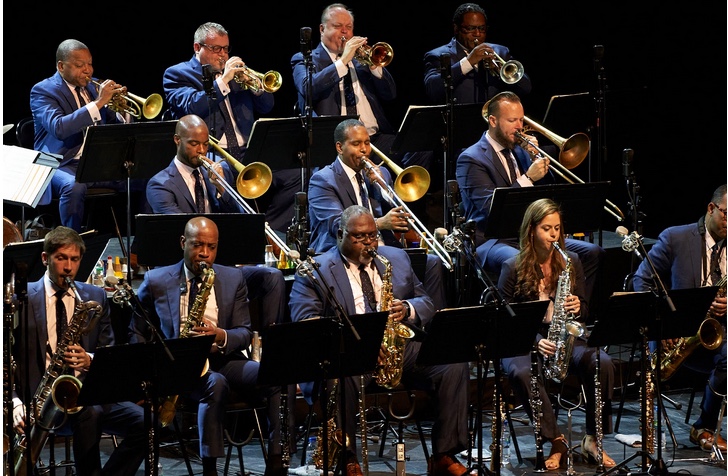by Kevin McLaughlin

It was a double privilege, then, to experience the Jazz at Lincoln Center Orchestra with Wynton Marsalis in EJ Thomas Hall on Saturday, April 20. First, to hear the JLCO again in Akron “after forty years” (according to Marsalis), and second, to hear this ensemble perform the Ellington book at the very highest level of technical skill and as mindful stewards of jazz tradition.
Presented by Tuesday Musical, the program was a rich survey of Ellington “hits” supplemented by obscure numbers and surprises. Throughout the evening, Marsalis soloed infrequently, serving mostly as emcee, and in a supporting role in the trumpet section.
Main Stem (1942), “Amad” from Far East Suite (1967), and Ad Lib on Nippon (1964) featured impressive bass work from Carlos Henriquez. Chinoiserie was an “Afro-Eurasian” (Ellington) vehicle for virtuosity from pianist Dan Nimmer and tenor saxophonist Victor Goines. When Marsalis introduced a piece written for Ellington by the Cuban trombonist Juan Tizol, it wasn’t Caravan, but an infectious and slickly updated Moon Over Cuba (originally 1941).
Mindful of the Ellington arranging voice as fundamental to the Ellington sound, saxophonist Ted Nash, who did most of the arranging for this show, left classic tunes like The Mooche, Mood Indigo, and Concerto for Cootie largely intact, allowing for innovation during the improvised solos. The famous Mood Indigo trio melody — an overtone-producing combination of muted trumpet, trombone, and clarinet — was especially fun to see (and hear) in performance.
Also a pleasure were the “talking” plunger trombone and trumpet solos in Concerto for Cootie and Black and Tan Fantasy, kept fresh through original licks by trumpeters Ryan Kisor and Marcus Printemp and trombonist Chris Crenshaw.
To his credit, when it came time for alto saxophonist Sherman Irby’s feature, Big Fat Alice’s Blues, he did not try to imitate Johnny Hodges, Ellington’s supreme alto soloist from the 1940s, though he might have. Instead, Irby made the stage his own playground, often solo, and sometimes in dialogue with bassist Carlos Henriquez and drummer Obed Calvair.
What began as a straight-ahead blues-groove tune became a magnificent tour-de-force of solo and response. Timing and pacing and form all belonged to Irby and his accomplices, who followed him through every lull and peak, and change of rhythmic groove. There was a wave of thrill in the collective spontaneous creation. As Marsalis pointed out afterwards — half in astonishment — other than the opening head, all events, design, and strategies of form of the preceding “were all them” (the players’ own), not preplanned.
Some still like to carp about Marsalis’s rear-view orientation, but early jazz isn’t all the band plays, as Ted Nash recently explained in an interview with this publication. Newer pieces by living composers — increasingly from JLCO’s own ranks — are just as frequently performed, as are new arrangements of traditional repertoire, like the Ellington show.
Extended applause from the sold-out audience allowed the band to bow, saunter off stage, then take a few seconds before returning to their places for one last encore: Ellington’s marvelously inventive jazz waltz “Paris Stairs,” from the 1961 movie soundtrack for Paris Blues.
Published on ClevelandClassical.com April 25, 2024
Click here for a printable copy of this article


